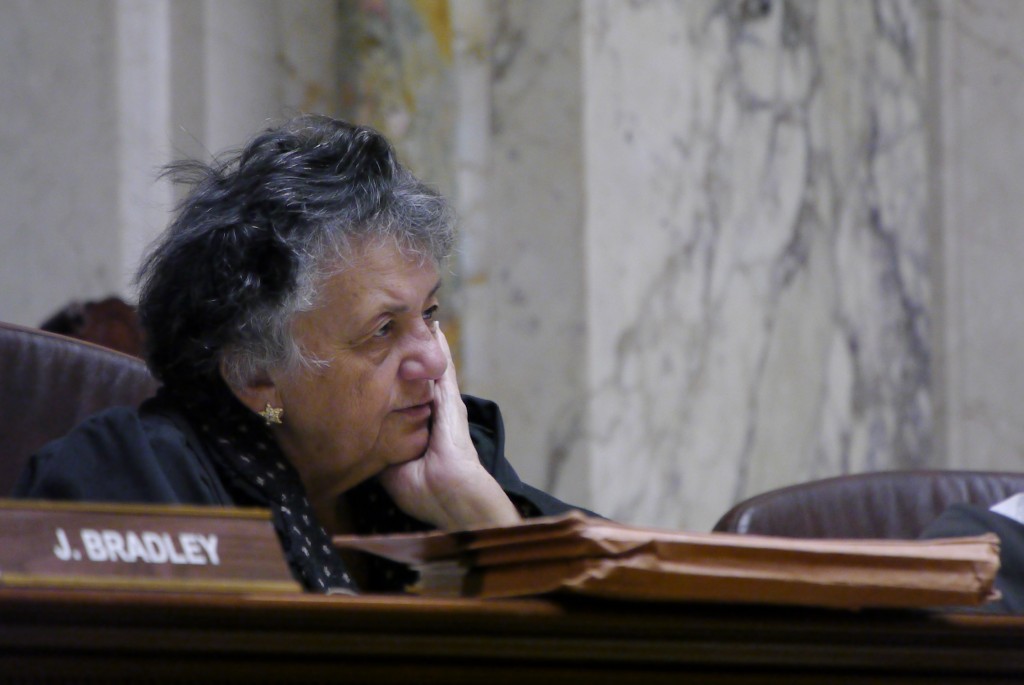Abrahamson’s Career from Dominator to Dissenter
Justice Shirley Abrahamson who joined the high court in 1976 and led the court for years, won't be running for another term.
Supreme Court Justice William Bablitch was mad. For years, he had started his Capitol work day by picking up one of the Court’s copies of the Wisconsin State Journal newspaper and catching up on the news.
But, without consulting her fellow justices or displaying collegiality, Chief Justice Shirley Abrahamson had canceled all but one of the court’s State Journal subscriptions. For Bablitch, the six other justices and their aides, it was first come, first read.
A former state Senate majority leader, Bablitch was no stranger to power and how to use it. Still, “That damn Shirley,” muttered Bablitch, who retired from the court in 2003 and died in 2011.
The story illustrates the dictatorial way Abrahamson ran the Supreme Court, and led the state’s Appeals and Circuit courts, as chief justice from 1996 until 2015. She was the court’s longest serving chief justice.
But that wasn’t the only record set by the intimidatingly smart, liberal Abrahamson, who said last week she will leave the court when her current term ends in mid-2019.
According to the Milwaukee Journal Sentinel, Lucey noted the history he was making by choosing Abrahamson instead of someone who had been a judge: “This appointment affords an opportunity for one woman to help right the wrongs that have faced all women over the years.”
Abrahamson joined the court in August 1976 and is scheduled to leave it in August 2019, 43 years later. That is also a record tenure for a state Supreme Court justice. It’s also more than half of her life; she will turn 85 in December.
Abrahamson won full 10-year terms in 1979, ’89, ’99 and 2009. In 1999, Bablitch and other justices endorsed her opponent. It didn’t matter; she won easily.
Three leading female jurists listed Abrahamson’s many accomplishments.
“I don’t know anybody smarter or who works harder than she does,” former Justice and Marquette Law School Professor Janine Geske told the Journal Sentinel. “She clearly was of the quality that could have been on the U.S. Supreme Court.”
Geske noted something Capitol workers observed for decades. Abrahamson worked exceptionally long hours, week days and weekends. Recently, though, undisclosed health issues forced her to work from home, monitoring court arguments and conferences electronically.
Another pioneering female jurist, U.S. District Judge Barbara Crabb, a federal judge since 1979, noted Abrahamson’s “immense amount of work and scholarship.”
“She was an extraordinary lawyer and she did almost everything,” Crabb said. “She did many, many opinions and she was active in a lot of legal activities. She delivered speeches. She’d talk wonderfully to people, whether second-graders or legal giants in the field.”
On the court, Abrahamson is closest to Justice Ann Walsh Bradley. The two noted, often in biting dissents, as conservatives dominated the court over the last 10 years.
Abrahamson’s legal opinions were so brilliant, Walsh Bradley told the Journal Sentinel, that her dissents “will go to the U.S. Supreme Court and be a majority opinion.”
Recent years have been Abrahamson’s toughest, however.
Republican legislators asked voters to change the state Constitution so that the chief justice is chosen by a vote of the seven justices. The most senior justice had automatically been the chief since the court was established in 1841.
Voters agreed with the change in 2015, and conservative justices quickly replaced Abrahamson with Chief Justice Pat Roggensack. Abrahamson first sued, arguing that she should be allowed to finish her term as chief, but then dropped the lawsuit.
Her husband of 63 years, Seymour Abrahamson, a UW-Madison geneticist, died in July 2016.
Last year, despite the objections of Abrahamson and Walsh Bradley, court conservatives voted to hold court administrative conferencesin secret.
Personal and professional losses visibly weighed on Abrahamson, who walked more slowly into the Capitol. Then, her health prevented her from even coming to the Capitol.
Abrahamson will keep pointing out the mistakes of her fellow justices, however. She vowed to “continue to speak with the clarity, forthrightness and compassion that come from a life I have tried to devote to service and to justice for all.”
Steven Walters is a senior producer for the nonprofit public affairs channel WisconsinEye. Contact him at stevenscotwalters@gmail.com.
The State of Politics
-
A Wisconsin Political Trivia Quiz
 Dec 15th, 2025 by Steven Walters
Dec 15th, 2025 by Steven Walters
-
The Fight Over Wisconsin’s House Districts
 Dec 8th, 2025 by Steven Walters
Dec 8th, 2025 by Steven Walters
-
The Battle Over On-Line Betting
 Nov 24th, 2025 by Steven Walters
Nov 24th, 2025 by Steven Walters






















